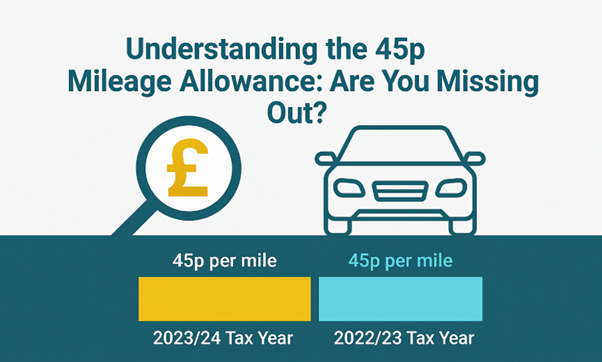-
News
-
Blog
-
Archive

If you regularly use your personal vehicle for work purposes, you may be entitled to claim the 45p mileage allowance — a valuable tax relief that many UK workers, freelancers, and business owners overlook. Whether you're a self-employed professional, a contractor, or an employee travelling for business, knowing how to claim correctly could save you hundreds, if not thousands, of pounds each year.
In this article, we'll explain what the mileage allowance is, how it works, and how accountants in Bolton and Manchester can help you maximise your claim while staying fully HMRC-compliant.
What Is the 45p Mileage Allowance?
The mileage allowance is the rate set by HM Revenue & Customs (HMRC) that you can claim as an expense for using your personal car, van, motorcycle, or bicycle for work-related journeys.
For the 2024/25 tax year, HMRC's Approved Mileage Allowance Payments (AMAP) rates are:
Vehicle Type |
First 10,000 Miles |
Over 10,000 Miles |
Car/Van |
45p per mile |
25p per mile |
Motorcycle |
24p per mile |
24p per mile |
Bicycle |
20p per mile |
20p per mile |
It's important to note that this rate covers fuel, wear and tear, insurance, and other vehicle running costs. You cannot claim additional expenses for these items separately if you use the mileage method.
Who Can Claim?
You can claim mileage allowance if you:
- Are self-employed and use your personal vehicle for business trips.
- Are an employee who uses your own vehicle for work and is not reimbursed the full HMRC rate by your employer.
- Are a director of a limited company using your personal vehicle for business purposes.
You cannot claim for ordinary commuting between home and your permanent place of work — only for business-related journeys, such as visiting clients, travelling between sites, or attending off-site meetings.
Common Scenarios Where You Could Claim
- A freelance consultant visiting multiple clients across Greater Manchester.
- A construction subcontractor driving to different job sites daily.
- A sales representative attending trade shows or exhibitions in other cities.
- A limited company director travelling for business in their own car.
How to Calculate Your Mileage Claim
Calculating your claim is straightforward if you keep accurate records. For example:
If you drove 8,000 miles for business purposes in the tax year using your car:
8,000 miles × £0.45 = £3,600
This £3,600 can be deducted from your taxable profit (if self-employed) or claimed as tax relief (if employed and underpaid mileage by your employer).
The Importance of Record-Keeping
To claim mileage, you must keep detailed records that include:
- Date of the journey
- Purpose of the journey
- Start and end locations
- Number of miles travelled
HMRC can request evidence during an enquiry, so keeping a mileage logbook or using mileage-tracking apps such as MileIQ or Tripcatcher is highly recommended.
Common Mistakes That Cost You Money
- Claiming for commuting – This is not allowed unless travelling to a temporary workplace.
- Forgetting smaller trips – Even short local journeys to meet clients add up over a year.
- Not tracking miles accurately – Estimating can result in over- or under-claiming.
- Mixing business and personal mileage – Only claim for the business portion.
How Accountants Can Help Maximise Your Mileage Claim
While the rules seem straightforward, mistakes are common — and they can be costly if HMRC investigates. Experienced accountants in Bolton and Manchester can:
- Ensure you're claiming the correct rate for your vehicle and mileage.
- Advise whether you should use the mileage method or the actual expenses method (where you claim a percentage of actual vehicle costs).
- Help you log and organise mileage records efficiently.
- Make sure your claims are HMRC-compliant to avoid penalties.
The Bigger Picture: Mileage Claims and Tax Efficiency
Mileage allowance is just one part of a broader tax efficiency strategy. Combining it with other allowable expenses — such as subsistence (meals while travelling), professional fees, and home office costs — can significantly reduce your taxable income.
If you operate through a limited company, your accountant can also explore paying mileage allowances through payroll and structuring your remuneration to maximise tax savings.
Final Thoughts
The 45p mileage allowance may seem small per mile, but over a year it can amount to a substantial tax saving — especially for professionals who travel frequently for business. The key is to track your journeys accurately and claim everything you're entitled to.
If you think you may have missed out on past claims, it's possible to backdate mileage claims for up to four tax years — another area where professional advice can pay off.
Don't leave money on the road!
Contact YRF Accountants today to ensure you're claiming the full mileage allowance you deserve. We help self-employed individuals, contractors, and company directors across Bolton and Manchester save money and stay HMRC-compliant.
Call us on 01204 938696 or book your free consultation here.